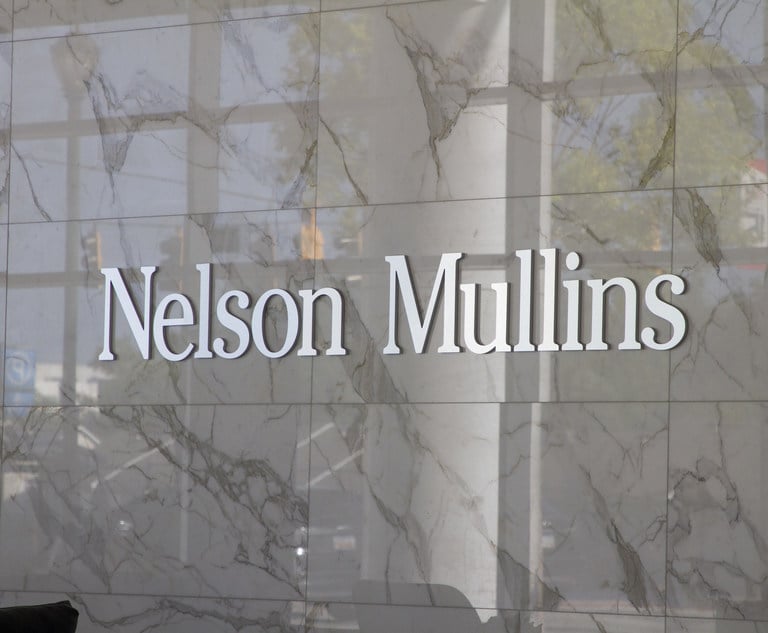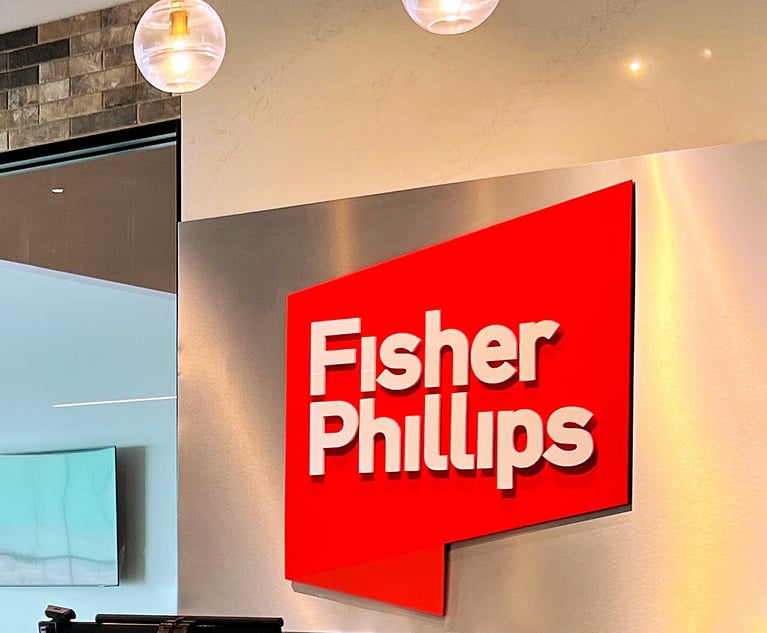 Shari Klevens (left) and Alanna Clair, Dentons. (Courtesy photo)
Shari Klevens (left) and Alanna Clair, Dentons. (Courtesy photo)Don't Load Ethics Problems Into Your Boxes When Moving Offices
When a firm moves, challenges include determining where old paper files will be stored and how to safely and confidentially transport e-documents to new computer networks and servers.
July 29, 2019 at 01:17 PM
7 minute read
Moving from one home to another can be a logistical headache. Notifying the postal service, updating utility companies and ensuring all necessary changes are made can be time-consuming and stressful. The same issues exist when a law firm moves from one location to another.
While it used to be that law firms would open a location near the closest courthouse and stay in the same place for decades, law firms are more like any other business now in that the firms may try to maximize their potential by moving offices closer to clients or closer to the business centers in a city. Thus, when an attorney or firm relocates their office, it involves much more than simply packing up boxes of files.
When a firm moves, there may be more challenges now than in the past. These challenges include determining where old paper files will be stored and how to safely and confidentially transport e-documents to new computer networks and servers, which may create unique cybersecurity risks.
Sometimes, a firm will use the move as a justification for cleaning house, discarding old files or updating systems. By being aware of the ethical rules governing a firm's maintenance of files, a firm can ensure that cleaning house does not create unnecessary risk.
Attorney Obligations
When determining what information or documents to keep upon a move, attorneys can consider their obligation to maintain information necessary to fulfill professional duties and protect client confidences and secrets. For example, Georgia Rule of Professional Conduct 1.16(d) states: “Upon termination of representation, a lawyer shall take steps to the extent reasonably practicable to protect a client's interests, such as … surrendering papers and property to which the client is entitled.”
Thus, firms can consider whether they have an obligation to maintain—or return—certain files in order “to protect a client's interests.” If documents needed to protect client interests have been destroyed, the law firm risks not only the ability to defend against a legal malpractice claim, but also may receive a bar grievance for failing to take the steps necessary to surrender papers and property to which the client is entitled.
This does not require law firms to maintain all records and papers indefinitely, however. Law firms can consider the costs associated with storing old files. For every law firm, the level of risk the firm is willing to take when disposing of old files versus the price it is willing to spend to keep them in storage will vary; there is rarely a one-size-fits-all solution to this issue.
Think About the Type of Information
One of the big questions to answer is how long client files and documents need to be kept by the firm. In determining that threshold timing, firms may be able to dispose of client materials (in a secure way), if they do not need to be maintained. Otherwise, firms may need to take the expense of moving their files to their new location, if the requisite time period has not yet run.
Generally, documents from closed files can be divided into three categories. The first category is documents, such as originals, that have special legal significance (wills, leases, contracts, etc.) Some firms will decide to keep these documents at a minimum for the number of years required by state bar rules, but not less than the time needed for full operational effect of the document. Rule 1.15(I)(a)(1) of the Georgia Rules of Professional Conduct requires attorneys to keep “[c]omplete records of [] account funds and other property … for a period of six years after termination of the representation.”
The second category includes documents subject to a “litigation hold.” A litigation hold often exists when a pending litigation or government investigation may implicate the documents. The litigation hold may dictate how long the law firm is required to retain the documents in the file. Because the destruction of documents despite a litigation hold can bring serious ramifications, many firms will take care to retain the documents until the litigation hold is no longer in effect.
The third category encompasses nearly all other documents. Many attorneys will consider the statute for a legal malpractice claim in determining how long to hold on to a file because that file may be useful to mount a defense against allegations regarding the handling of the matter. These documents can be retained for the number of years required by state bar rules or until the statute of limitations for any legal malpractice claims has lapsed, whichever is greater.
ABA's Guidance
The ABA, in Informal Opinion 1384, identifies some additional considerations for attorneys deciding how long to hold onto materials or documents:
1. Unless the client consents, a lawyer should not destroy or discard items that clearly or probably belong to the client. Such items include those furnished to the lawyer by or on behalf of the client, the return of which could reasonably be expected by the client and original documents (especially when not filed or recorded in the public records).
2. A lawyer should use care not to destroy or discard information that the lawyer knows or should know may still be useful to the assertion or defense of the client's position in a matter for which the applicable statutory limitations period has not expired.
3. A lawyer should use care not to destroy or discard information that the client may need, has not previously been given to the client, is not otherwise readily available to the client and which the client may reasonably expect will be preserved by the lawyer.
4. In determining the length of time for retention of dispositions of a file, a lawyer should exercise discretion. The nature and contents of files may indicate a need for longer retention than do the nature and contents of other files, based upon their obvious relevance and materiality to matters that can be expected to arise.
5. A lawyer should take special care to preserve, indefinitely, accurate and complete records of the lawyer's receipt and disbursement of trust funds.
6. In disposing of a file, a lawyer should protect the confidentiality of the contents.
7. A lawyer should not destroy or dispose of a file without screening it in order to determine that consideration has been given to the matters discussed above.
8. A lawyer should preserve, perhaps for an extended time, an index or identification of the files the lawyer has destroyed or disposed of.
Shari L. Klevens is a partner at Dentons in Atlanta and Washington, D.C., and serves on the firm's U.S. board of directors. She represents and advises lawyers and insurers on complex claims and is co-chair of Dentons' global insurance sector team.
Alanna Clair, also a partner at the firm in Washington, focuses on professional liability and insurance defense. Klevens and Clair are co-authors of “The Lawyer's Handbook: Ethics Compliance and Claim Avoidance” and the upcoming 2020 edition of “Georgia Legal Malpractice Law.”
This content has been archived. It is available through our partners, LexisNexis® and Bloomberg Law.
To view this content, please continue to their sites.
Not a Lexis Subscriber?
Subscribe Now
Not a Bloomberg Law Subscriber?
Subscribe Now
NOT FOR REPRINT
© 2024 ALM Global, LLC, All Rights Reserved. Request academic re-use from www.copyright.com. All other uses, submit a request to [email protected]. For more information visit Asset & Logo Licensing.
You Might Like
View All
On the Move: Hunton Andrews Kurth Practice Leader Named Charlotte Managing Partner
6 minute read
Husch Blackwell, Foley Among Law Firms Opening Southeast Offices This Year
9 minute read

Trending Stories
- 1Decision of the Day: Administrative Court Finds Prevailing Wage Law Applies to Workers Who Cleaned NYC Subways During Pandemic
- 2Trailblazing Broward Judge Retires; Legacy Includes Bush v. Gore
- 3Federal Judge Named in Lawsuit Over Underage Drinking Party at His California Home
- 4'Almost an Arms Race': California Law Firms Scooped Up Lateral Talent by the Handful in 2024
- 5Pittsburgh Judge Rules Loan Company's Online Arbitration Agreement Unenforceable
Who Got The Work
Michael G. Bongiorno, Andrew Scott Dulberg and Elizabeth E. Driscoll from Wilmer Cutler Pickering Hale and Dorr have stepped in to represent Symbotic Inc., an A.I.-enabled technology platform that focuses on increasing supply chain efficiency, and other defendants in a pending shareholder derivative lawsuit. The case, filed Oct. 2 in Massachusetts District Court by the Brown Law Firm on behalf of Stephen Austen, accuses certain officers and directors of misleading investors in regard to Symbotic's potential for margin growth by failing to disclose that the company was not equipped to timely deploy its systems or manage expenses through project delays. The case, assigned to U.S. District Judge Nathaniel M. Gorton, is 1:24-cv-12522, Austen v. Cohen et al.
Who Got The Work
Edmund Polubinski and Marie Killmond of Davis Polk & Wardwell have entered appearances for data platform software development company MongoDB and other defendants in a pending shareholder derivative lawsuit. The action, filed Oct. 7 in New York Southern District Court by the Brown Law Firm, accuses the company's directors and/or officers of falsely expressing confidence in the company’s restructuring of its sales incentive plan and downplaying the severity of decreases in its upfront commitments. The case is 1:24-cv-07594, Roy v. Ittycheria et al.
Who Got The Work
Amy O. Bruchs and Kurt F. Ellison of Michael Best & Friedrich have entered appearances for Epic Systems Corp. in a pending employment discrimination lawsuit. The suit was filed Sept. 7 in Wisconsin Western District Court by Levine Eisberner LLC and Siri & Glimstad on behalf of a project manager who claims that he was wrongfully terminated after applying for a religious exemption to the defendant's COVID-19 vaccine mandate. The case, assigned to U.S. Magistrate Judge Anita Marie Boor, is 3:24-cv-00630, Secker, Nathan v. Epic Systems Corporation.
Who Got The Work
David X. Sullivan, Thomas J. Finn and Gregory A. Hall from McCarter & English have entered appearances for Sunrun Installation Services in a pending civil rights lawsuit. The complaint was filed Sept. 4 in Connecticut District Court by attorney Robert M. Berke on behalf of former employee George Edward Steins, who was arrested and charged with employing an unregistered home improvement salesperson. The complaint alleges that had Sunrun informed the Connecticut Department of Consumer Protection that the plaintiff's employment had ended in 2017 and that he no longer held Sunrun's home improvement contractor license, he would not have been hit with charges, which were dismissed in May 2024. The case, assigned to U.S. District Judge Jeffrey A. Meyer, is 3:24-cv-01423, Steins v. Sunrun, Inc. et al.
Who Got The Work
Greenberg Traurig shareholder Joshua L. Raskin has entered an appearance for boohoo.com UK Ltd. in a pending patent infringement lawsuit. The suit, filed Sept. 3 in Texas Eastern District Court by Rozier Hardt McDonough on behalf of Alto Dynamics, asserts five patents related to an online shopping platform. The case, assigned to U.S. District Judge Rodney Gilstrap, is 2:24-cv-00719, Alto Dynamics, LLC v. boohoo.com UK Limited.
Featured Firms
Law Offices of Gary Martin Hays & Associates, P.C.
(470) 294-1674
Law Offices of Mark E. Salomone
(857) 444-6468
Smith & Hassler
(713) 739-1250






